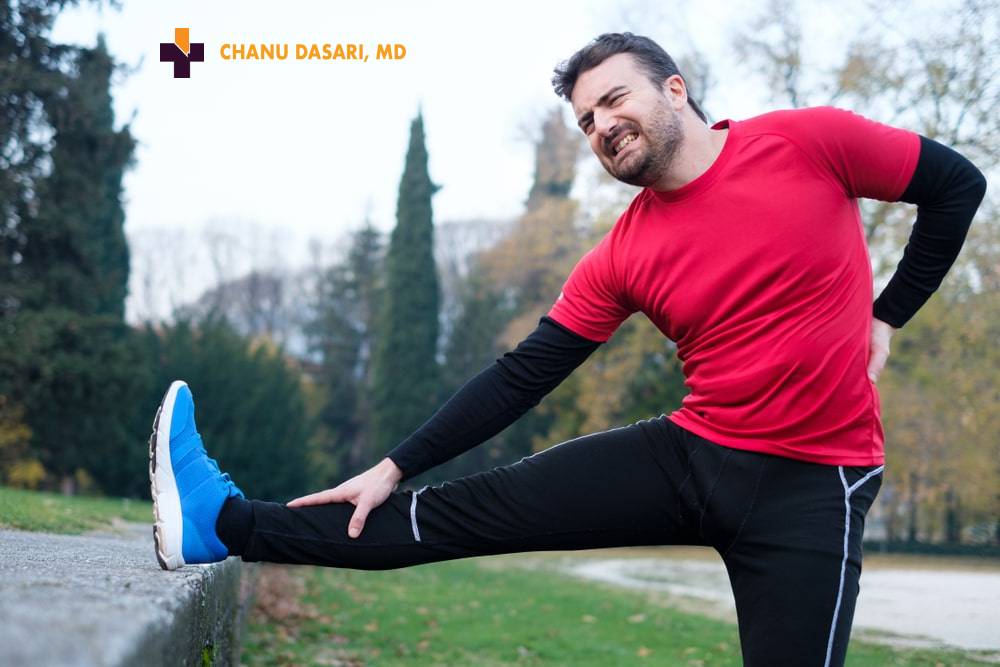Sports Hernia
Sports hernia symptoms, diagnosis, and exceptional minimally invasive treatments.
Dr. Chanu Dasari has performed thousands of sports hernia treatments and has become regarded as one of the top general surgeons in the country. Procedures are minimally invasive and patients are able to get back to normal activities within a few weeks.

What Are Sports Hernias?
Medically known as athletic pubalgia, a sports hernia develops when the muscles in the lower abdomen are strained to the extent that they tear or rip. This can cause intense pain in the groin area and lower abdomen. The pain in this type of hernia injury usually starts off slowly and increases in ferocity over time. Both professional and recreational athletes are susceptible to sports hernias which occur in both men and women.
Those with strong abdominal muscles can still be affected by sports hernias. The reason for this is because sports hernias do not occur all at the same time. Instead, they develop progressively through concurrent contractions of the abdomen and thigh muscles pulling in different directions. This can occur commonly during side-to-side movements. that cause tiny tears in the muscles. This may aggravate the abdominal muscles until it becomes a more severe problem.
Diagnosing Sports Hernias
Dr. Dasari determines diagnosis through a personalized evaluation and examination of a patient’s health history. Additional tests may be performed to rule out any other potential causes for the patient’s groin pain. Although a sports hernia can be detected through an MRI, it does not always show positive. Most of the time, basic methods can reveal if one has a sports hernia. Methods include having patients perform sit-ups or leg lifts. If pain increases intensely during those movements, it’s very likely the patient may have a sports hernia.

Signs and Symptoms of a Sports Hernia
The signs and symptoms that commonly occur with sports hernias include:
Pain in the upper inner thigh muscles
Pain in groin aggravated by exercise
Frequent sensitivity with the groin
Tenderness or discomfort over the pubic tubercle
The pain that can occur from a sports hernia begins slowly with a pang in the groin region and/or lower abdomen. Usually occurring on one side of the abdomen, the pain can worsen with sudden movements like sprinting, kicking, and other intense physical activity.
Sports Hernia Repair and Treatment
When dealing with a sports hernia, rest can be the best treatment partnered with applying ice 3 to 4 times to the injured area for 20 to 30 minutes. Your doctor may also suggest you take anti-inflammatory medicines with an expectation of a few weeks to a few months for the symptoms to go away. It’s important to note though, the longer you continue to participate in activities that caused the original injury, the longer it may take for you to heal.
If the initial treatments described above do not ease the symptoms of the sports hernia, surgical treatment may be required to correct the damaged abdominal wall. Dr. Dasari believes in treating his patients with a personalized approach. This is because the type of surgery for sports hernias can differ based on the physical activity that caused the injuries. Dr. Dasari’s sports hernia procedures take into account your specific needs with treatment plans designed accordingly.
Recovery After Sports Hernia Repair
Dr. Dasari believes in an enhanced recovery plan after surgery that is customized to his patient’s needs. Between 65% and 90% of athletes who undergo sports hernia treatment return to their favorite sports within six weeks.
No insurance? No problem.
Dr. Dasari welcomes and accommodates uninsured, direct-pay clients and offers special discounts for those traveling from other states or countries. If you are looking for the highest quality of minimally-invasive sports hernia treatments without the involvement of your insurance company, contact our caring staff today!
Traveling from Afar?
Dr. Dasari sees patients who are seeking specialized minimally invasive treatments from out of the state such as from California, Utah, Arizona, Texas, New York, Florida, Georgia, Kansas, Missouri, Tennessee, Illinois, Indiana, and Hawaii. He also sees patients from outside of the country such as from the UK, Australia, China, Saudi Arabia, and Mexico.
Dr. Dasari’s team assists with arrangements for your visit, including priority appointment times, special accommodations, and travel logistics. An online consultation and health records review will be scheduled.
